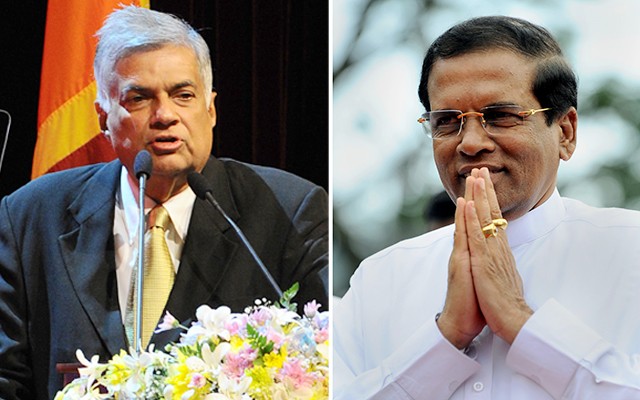The concept of postmodernism is a late 20th century critical movement that arose to respond to art, architecture and later impacting its presence in philosophy, culture, history, and other fields of intellectual pursuits in continental Europe. The American device of post structuralism and Jacques Derrida’s proposition of deconstruction are indeed vibrant intellectual movements that countered certain religious dogmatisms and aged-old-held-absolutist approach to life and reality. The resulting effect was a form of hybridity that most postcolonial theorists took up in their critical approach to the treatment of the colonies as an object of study (Orientalism, Edward Said critiques it comprehensively),dichotomizing East-West relations.It is in this light the political undercurrent since January 8 is brought under scrutiny in the piece below.
January 8
What kind of politics that is being in operation since ‘the Sirisena victory’ over Mahinda is a crucially important matter for discussion? What Sri Lanka has now is a President who is the chairperson of the SLFP, but considered by the ordinary SLFPers as someone who betrayed the party, elected mostly by the UNPers and the Tamil and Muslim block vote. The SLFP parliamentarians entertain a love-hate relationship with their party head, and the more radical UPFA parliamentarians would not trust him and perhaps consider a political hybrid belongs to no party, therefore an identity-less persona. President cannot be blamed for this scenario. He himself either wonders about his political identity or simply he is a classically forced hybridaised post-ideology statesman of South Asia. He is to be credited for his hybridity displayed so far.
Post January 8 is a turning point in the political landscape since independence. End of 100 days with the half-baked 19A and the pending 20A are typical tactical politics devoid of policy and principles
This postmodern political disposition of the President is infectious because the SLFP parliamentarians argue that Sirisena is their ‘blue man’ in ‘green clothes’. President says that he will not abandon the UNP because it helped to end an era of corruption, fraud and disrespect for the rule of law on the island in which he was part during his ministerial days which he perhaps conveniently forgets. The JVP did not overtly support the president, but campaigned vehemently against the UPFA presidential candidate which also indicates their post-ideology inevitability. They are no longer a revolutionary party, well tamed, fits comfortably in parliamentary politics with scanty street protests and one wonders whether it is a Marxist-Leninist party at all, displays perfect postmodern hybridized politics.
Somawansa Amarasinghe’s defection is symbolic of JVP’s splinterising hybridity. The JHU has always been a postmodern political party, rejecting, absorbing, adjusting and reframing their ideology and strategy. Some suggest that they have been skillfully opportunistic for their piece of the pie. Buddhism, nationalism, heritage and sharp critique of the establishment remain their tools of post-ideologypolitics of that opportunism and adoptability become their trade mark. They are a prefect hybrid too. UNP parliamentarians display liberal thinking but their loyalties within the party are hybridized as some of them have severely criticized Ranil himself. UNP leadership in the person of Ranil perhaps is the only unaffected politician by the wings of postmodern political influence because he is ardently and conservatively liberal to his marrow.There is perhaps hybridity in his personal story. The difference between him and CBK is that Ranil displays political maturity to withstand criticism, failure, shameful defeats and resilient comebacks while CBK lacks that same maturity, but shifts between radically liberal and liberal foolhardiness – a perfect persona of hybridized post-ideologypolitical animal.
The former president, Mahinda had been too long in the political game, is an adrift too with post-ideology pursuits as he built is grand coalition as a grand juggler, but Sri Lanka remains his catchment area and internationalism is not his forte so is the case of president Sirisena. They both act like fish out of water among their global counterparts, a core indication of post-ideology symptoms. They both will say yes and no to the same question posed to them at different times in a sound cut and in front a camera. One has to tolerate them for who they are, they cannot perform more than what they know and are used to.
Mr. Cleans
Post January 8 is a turning point in the political landscape since independence. End of 100 days with the half-baked 19A and the pending 20A are typical tactical politics devoid of policy and principles. The TNA and the Muslim parties themselves are perfect hybrids of our times, with a mix of arsenal ideologies personal interests and agendas determined by the actors in the distant theatres. Interestingly the voters too function with their suffrage with a subtle post ideology axiom to elect their preferred men and women to govern them. Their contract is becoming more difficult to be bought by the election time goodies. They will accept them but will not be influenced or guided by vote bribes. The next fleet of elections will be extraordinary and the nation will know the political behavior of the people. The UNP, JVP, JHU and TNA will have to sell a different story to win the legislature. The SLFP, what remains of UPFA have a herculean task to win back over and above all allegations. However, all of them have to prove to people that they can be clean. Non de facto hardly non in the above list could authentically criticize the other, as they are yet to be Mr. Cleans.
http://nation.lk/online/2015/06/13/political-wave/


